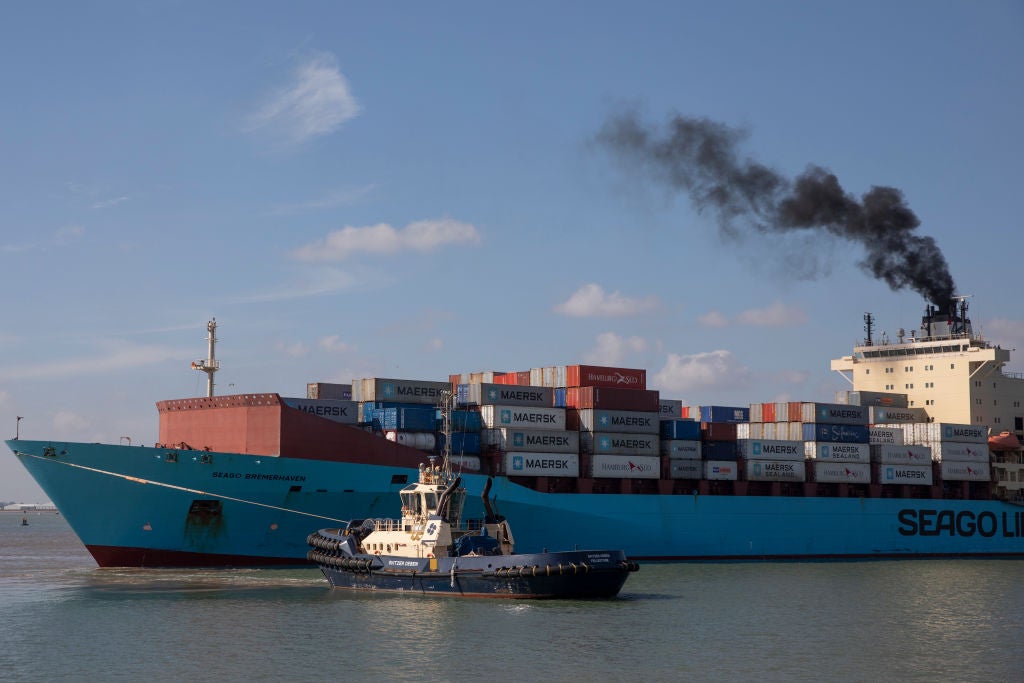Britain’s main freight ports cannot cope with existing conditions – let alone Brexit
Chaos at the UK’s main freight ports, it turns out, is nothing new. Coronavirus has made this worse, and that’s even before Brexit has happened, writes Chris Blackhurst


No sooner will we begin to see the light at the end of the pandemic tunnel, then along will come Brexit. How prepared are we? Will departing the EU spell chaos?
Well, by weird coincidence, on the same day that Pfizer announced that its Covid vaccine works, an email landed in my inbox. It was from a friend who runs his own importing business, shipping in products from Asia.
“I don't know if you are aware of the terrible congestion and delays at our ports. This has been caused by too many people being laid-off in the first lockdown and not all being rehired, resulting in a lack of skilled and unskilled workers.”
Then, he wrote, there is the “stringent adherence to Covid-19 safety rules, which causes the whole procedure of importation to take much longer. There is also an enormous backlog. The ports that deal with Asian shipments – Felixstowe, London and Southampton – are especially hard hit.”
Said my pal: “The result is that ships are unable to land their cargos, and many are offloading on the Continent and loading on to smaller vessels back into the UK.” He continued: “To give one example, a large shipment of ventilators was due to arrive on Nov 2 at Felixstowe. Docking was delayed for two weeks without a guarantee it would be docked. The vessel is now going to Rotterdam to unload, and then the ventilators will come back to UK on a smaller vessel. Probably not arriving until early December.”
I checked out his tale and, sure enough, our large container ports, Felixstowe in particular, are in crisis. Yet, there has been barely a squeak about this in the mainstream media. All I could find was one article in the FT from 19 October: “Delays at Felixstowe trigger calls for government intervention”. And one on Thisismoney back in September: “Felixstowe farce: Chaos at UK’s busiest container port spells potential crisis for small businesses as coronavirus-fuelled staff shortage creates backlog”.
My friend assured me that since these articles were written the situation has worsened. He asked if I thought the lack of coverage was due to the government pleading with the media to hold fire, for fear of sparking panic-buying, when people have already been stocking up? I very much doubt that, I replied. Given the choice between conspiracy and cock-up, I will always opt for the latter, on the basis the government is not capable of organising the former.
Besides, there is plenty of evidence of complaints galore and considerable anger in the road haulage and freight industry press and on their specialist websites.
It’s as my friend says. The main problems are the imposition of safety rules to combat the virus and a shortage of labour, which has resulted in hauliers and businesses not getting suitable time slots for collecting their containers.
What’s alarming about this is that, where Felixstowe is concerned, the port’s customers, the hauliers and freight-users maintain the problems are not new
At the most convenient, traditionally the busiest, times, there are simply not enough slots to go around. This has seen firms having to incur extra port storage costs. Some have resorted to using more expensive freight air services to bypass the UK sea ports.
There is much sarcasm in the industry directed to Felixstowe’s new adviser, Chris Grayling. The former transport secretary – he of the £13.8m contract awarded to a ferry company that owned no ferries – is being paid £100,000 a year by the port’s owner for seven hours work per week, according to his entry in the register of MPs’ interests.
To be fair to Grayling, the mess is not of his doing. Presumably, though, his job specification includes liaising with ministers on matters affecting the port. So far, the government has declined to act, saying that officials at the Department for Transport are monitoring the situation. If it is not aware already, the government should realise that 40 per cent of all containers coming into and departing from the UK do so via Felixstowe. If that port ceases to operate smoothly, the UK economy similarly slows.
Felixstowe’s difficulties have affected the other large UK container ports such as Southampton and London Gateway, as they try to cope with ships diverting to them. Those ports are also busy and slow.
Felixstowe is taking steps to try to alleviate the congestion. The port has extended its Sunday opening hours and is taking on more staff. But turnaround times are still too long. The waits, frustration and added expense prevail. This takes no account either of the fallout on the supply chain as manufacturers wait for the products they require to make their wares. Retailers are also facing the prospect of empty shelves and low stock – just as, in many cases, they come out of another lockdown and their sector enters its busiest, most crucial season.
What’s alarming about this, as well, is that where Felixstowe is concerned, the port’s customers, the hauliers and freight-users maintain the problems are not new. Bifa, the international freight forwarders’ association, says: “Bifa members have suffered from two years of poor service from the port, and we feel there is a need for independent intervention by the government.”
Meanwhile, the clock is counting down to the end of the year and the introduction of post-Brexit regulations and the possibility of tailbacks at our main freight ports. Right now, they cannot cope with existing conditions let alone an additional burden. What may occur does not bear thinking about.
There I was, elated by the vaccine news. That will teach me.
Join our commenting forum
Join thought-provoking conversations, follow other Independent readers and see their replies
Comments



Bookmark popover
Removed from bookmarks